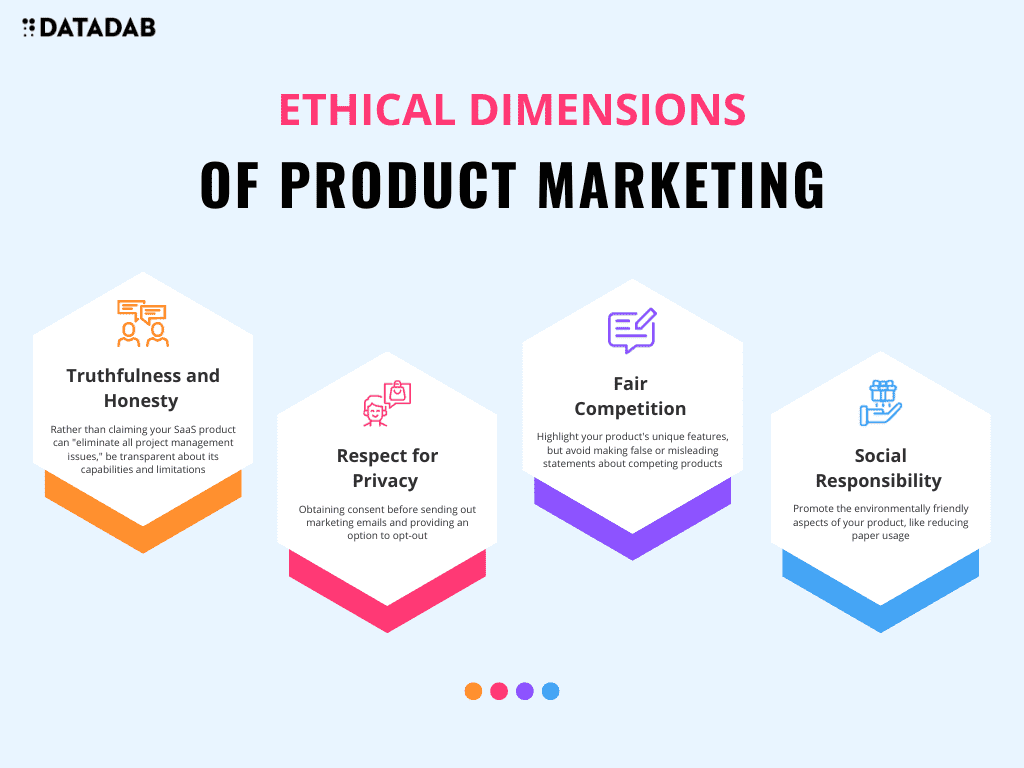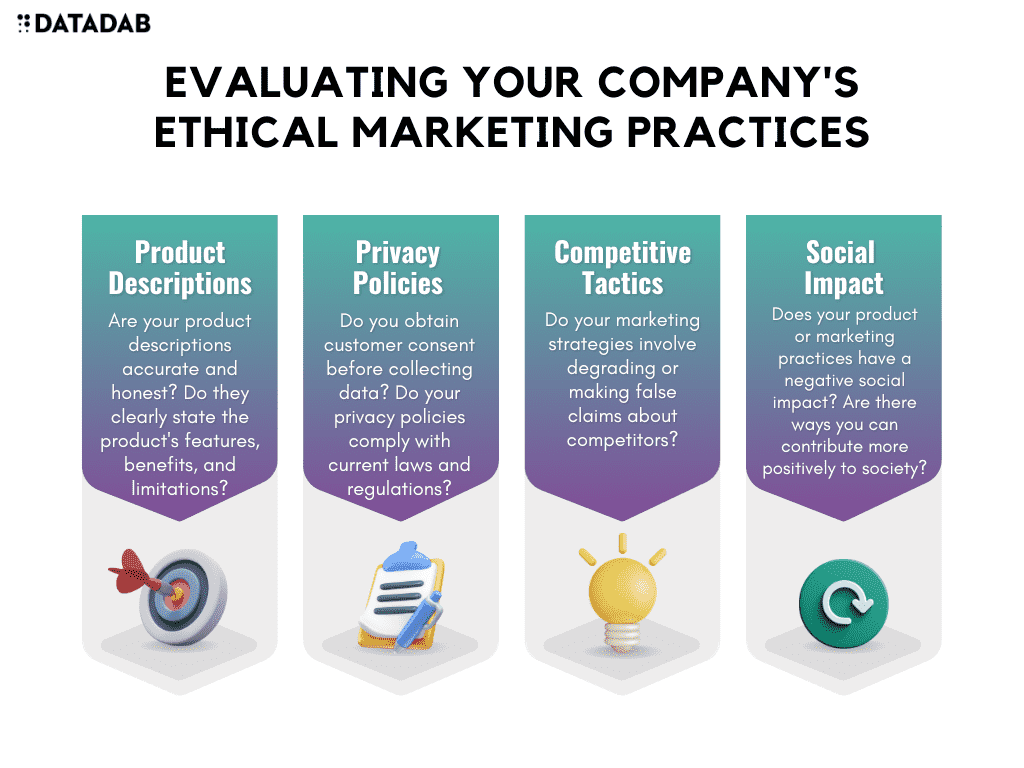"When ethics lead the way in marketing, trust follows and conversion happens."
Product marketing is an essential part of any business, driving brand awareness, customer engagement, and ultimately, sales. However, in our quest for success, it is vital that we don't lose sight of the ethical dimensions of product marketing. How we market our products can have a profound impact on our customers, society, and our company's reputation.

Understanding Ethics in Product Marketing
Ethics in product marketing refer to the moral principles that guide the decisions, strategies, and actions involved in marketing a product. These principles encompass everything from the authenticity of our claims, to the methods we use to sell our products, and even the way we target our audience.

In today's highly connected world, where customers have unprecedented access to information, ethical marketing has become more critical than ever. Being ethical in product marketing is not just about doing the right thing; it's about being transparent, building trust with customers, and ensuring the long-term sustainability of your business.
So, let's explore the key ethical dimensions of product marketing and learn how we can incorporate ethical practices into our marketing strategies.
The Ethical Dimensions of Product Marketing

1. Truthfulness and Honesty
Truthfulness and honesty are fundamental to ethical marketing. This encompasses everything from ensuring your product descriptions are accurate, to being honest about your product's capabilities and limitations.
Example: Let's say you're marketing a project management SaaS product. It might be tempting to claim that your software can "eliminate all project management issues," but if it can't, you're setting up your customers for disappointment and eroding their trust.
Instead, be transparent about what your product can and cannot do. If your software can streamline project workflows and improve communication, but cannot prevent human errors or foresee unexpected project hurdles, be upfront about that.
2. Respect for Privacy

With the rise of digital marketing, respect for privacy has become a significant ethical concern. This involves obtaining consent before sending marketing materials, not sharing customer data without permission, and respecting customers' choices about how their information is used.
Example: Consider email marketing for your SaaS product. Before sending out marketing emails, it's essential to get the recipients' consent. In addition, the emails should include an easy option for recipients to opt-out of future emails. Remember, a respectful approach to privacy not only avoids legal issues but also builds trust with your audience.
3. Fair Competition

Ethical product marketing also involves promoting your product without degrading your competitors. While it's perfectly acceptable to highlight your product's unique features and benefits, it's unethical to make false or misleading statements about competing products.
Example: If your project management software has a feature that your competitor's product lacks, you can highlight this in your marketing. However, claiming that your competitor's software causes project failure would be unethical unless you have undeniable proof.
4. Social Responsibility

Social responsibility involves ensuring that your product and marketing practices contribute positively to society. This might involve promoting environmentally friendly products, supporting social causes, or avoiding marketing practices that could harm vulnerable groups.
Example: If your SaaS product is designed to reduce paper usage and promote remote work, highlight these benefits in your marketing. Not only does this make your product more appealing to environmentally conscious customers, it also showcases your company's commitment to social responsibility.
| Ethical Issue | Impact | Possible Solutions |
|---|---|---|
| Misleading Claims | Can damage customer trust and lead to legal issues | Ensure all marketing messages are truthful and accurate. Regularly review and update product descriptions |
| Privacy Infringements | Can erode customer trust and violate privacy laws | Implement strict data protection measures. Obtain consent before collecting or using customer data |
| Unfair Competitive Practices | Can harm business relationships and lead to legal issues | Avoid negative or misleading statements about competitors. Highlight your product's unique features without degrading others |
| Ignoring Social Responsibility | Can lead to customer backlash and harm company reputation | Evaluate the social impact of your product and marketing practices. Support social causes and strive to reduce environmental impact |
Implementing Ethical Practices in Product Marketing
Now that we've explored the key ethical dimensions of product marketing, let's look at how we can incorporate these principles into our marketing strategies.

1. Foster a Culture of Ethics
Ethics should be ingrained in your company culture and not just a standalone policy. When your team understands the importance of ethical marketing and is committed to upholding these principles, it becomes easier to navigate the ethical dimensions of product marketing.
Practical steps:
2. Develop Ethical Guidelines for Marketing
Create a set of ethical guidelines for your marketing team. This document should outline your company's ethical standards and provide clear guidance on how to uphold these principles in various marketing situations.
Practical steps:
3. Prioritize Transparency
Transparency is a fundamental part of ethical marketing. This means being honest about your product's features, pricing, and limitations, as well as being open about your marketing practices.
Practical steps:
4. Engage in Ethical Advertising
Ethical advertising involves being truthful, non-deceptive, and fair in your advertising practices. It also involves respecting the rules and regulations of the advertising platforms you use.
Practical steps:
5. Be Socially Responsible
Being socially responsible means considering the social, environmental, and economic impact of your product and marketing practices. It involves actively contributing to the betterment of society, not just avoiding harm.
Practical steps:
Conclusion
Navigating the ethical dimensions of product marketing might seem daunting, but it's an essential part of building a sustainable, reputable, and customer-centric business. By fostering a culture of ethics, developing ethical guidelines, prioritizing transparency, engaging in ethical advertising, and being socially responsible, we can create marketing strategies that not only drive success but also contribute positively to our customers and society.
Remember, ethical marketing isn't just about avoiding negative consequences—it's about building trust, fostering long-term customer relationships, and creating a positive brand image. And in today's highly connected world, that's more important than ever.
So, let's strive to not only be successful marketers but also ethical ones. Because at the end of the day, the way we market our products says a lot about who we are as a company, and what we stand for.
FAQ
What is ethical product marketing?
Ethical product marketing refers to the application of ethical principles to the process of marketing a product. This includes being truthful and transparent in all marketing communications, respecting customer privacy, promoting fair competition, and demonstrating social responsibility. Ethical marketing ensures that all marketing activities are conducted with integrity, fairness, and respect for customers and society.
Why is ethical marketing important?
Ethical marketing is important for several reasons:
Customer Trust: Ethical marketing builds trust with customers. When customers know they can rely on your marketing to be truthful and respectful, they're more likely to trust your brand and remain loyal.
Legal Compliance: Many ethical marketing practices are also legal requirements. For example, privacy laws require businesses to obtain customer consent before collecting personal data.
Brand Reputation: Ethical marketing enhances your brand's reputation. When your company is known for its ethical practices, it can differentiate you from competitors and make your brand more appealing to customers.
Sustainability: Ethical marketing contributes to the long-term sustainability of your business. By prioritizing ethics, you can avoid potential legal issues, customer backlash, and damage to your brand's reputation.
What is an example of ethical product marketing?
An example of ethical product marketing is being transparent about your product's capabilities and limitations. For example, if you're marketing a project management software, you might be tempted to claim that your software can eliminate all project management issues. However, if it can't, making such a claim would be unethical. Instead, you should be upfront about what your software can and cannot do.
How can I make my marketing more ethical?
There are several ways to make your marketing more ethical:
Be Transparent: Be honest and open in all your marketing communications. This includes being clear about your product's features, benefits, and limitations, as well as being transparent about your pricing and any terms and conditions.
Respect Privacy: Ensure you're respecting your customers' privacy. This includes obtaining consent before collecting or using customer data, and providing clear and easy ways for customers to opt-out of marketing communications.
Promote Fair Competition: Avoid making false or misleading statements about your competitors. Instead, focus on highlighting your product's unique features and benefits.
Demonstrate Social Responsibility: Consider the social, environmental, and economic impact of your product and marketing practices. Strive to contribute positively to society and minimize any negative impacts.
What are the consequences of unethical marketing?
Unethical marketing can have serious consequences, including:
Loss of Customer Trust: When customers feel deceived or disrespected by your marketing, they're likely to lose trust in your brand. This can lead to a loss of customers and decreased sales.
Legal Issues: Many unethical marketing practices, such as false advertising or privacy infringements, are also illegal. This can result in legal penalties, such as fines or lawsuits.
Damage to Brand Reputation: Unethical marketing can harm your brand's reputation. Once your brand's reputation is damaged, it can be difficult to rebuild.
Decreased Employee Morale: Employees want to work for ethical companies. If your company is engaged in unethical marketing practices, it can lead to decreased employee morale and increased turnover.
How can I foster a culture of ethics in my company?
You can foster a culture of ethics in your company by incorporating ethics into your company values and mission statement, communicating the importance of ethical practices to your team, providing training on ethical decision-making, and holding everyone in your company accountable for upholding ethical standards.
What is ethical advertising?
Ethical advertising is a subset of ethical marketing that specifically
relates to the creation and dissemination of advertisements. It involves creating truthful, non-deceptive, and fair advertisements that respect customer privacy and comply with advertising laws and regulations. Ethical advertising also involves respecting the rules and guidelines of the advertising platforms you use.
What are some examples of unethical marketing practices?
Unethical marketing practices can take many forms, but some common examples include:
Misleading Claims: This involves making false or exaggerated claims about your product or its capabilities.
Invasion of Privacy: This could involve collecting or using customer data without consent, or sending unsolicited marketing communications.
Unfair Competition: This includes making false or misleading statements about your competitors, or engaging in other practices that degrade competitors to promote your own product.
Ignoring Social Responsibility: This could involve ignoring the negative social or environmental impacts of your product or marketing practices.
What are some ways to demonstrate social responsibility in marketing?
There are many ways to demonstrate social responsibility in marketing:
Environmentally Friendly Practices: You can reduce the environmental impact of your product and marketing practices, for example, by using recyclable materials for packaging, or reducing energy use in your operations.
Supporting Social Causes: You can support social causes that align with your company's values, for example, by donating a portion of your profits to a relevant charity, or partnering with non-profit organizations.
Considering Vulnerable Groups: Be mindful of how your marketing practices might impact vulnerable groups. For example, ensure your advertising does not exploit or exclude certain groups of people.
What role do ethical guidelines play in product marketing?
Ethical guidelines play a crucial role in product marketing. They provide a clear framework for what constitutes ethical and unethical marketing practices. This can help your marketing team make ethical decisions and avoid practices that could harm customers, society, or your company's reputation. Ethical guidelines also signal to your customers, employees, and the public that your company is committed to operating with integrity and respect.






